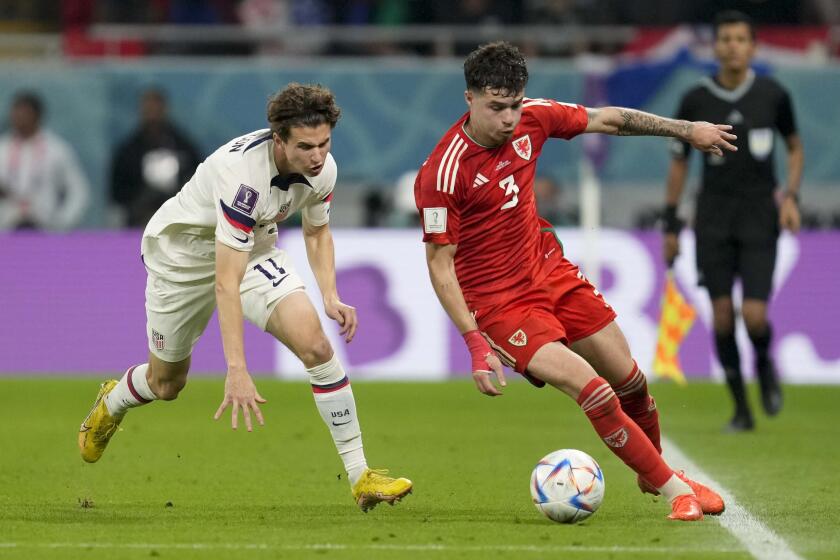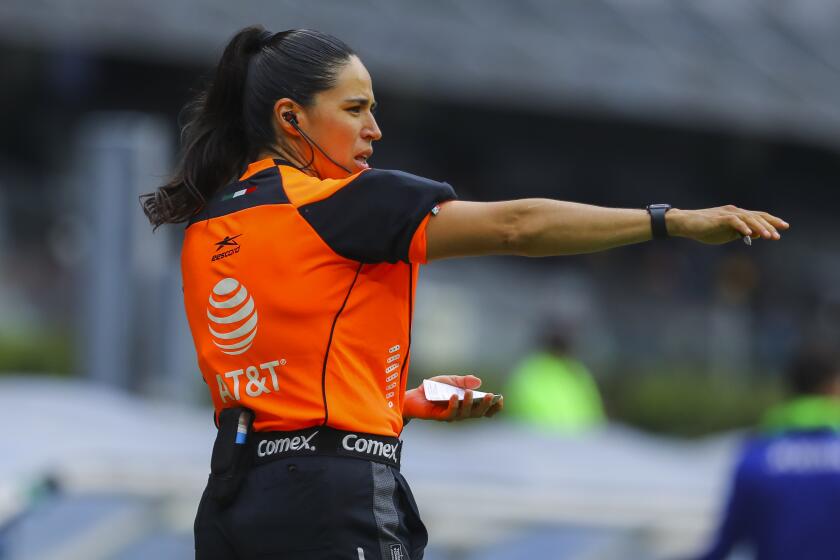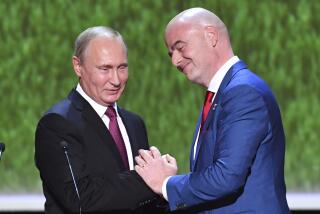World Cup roundup: Political protests flare in Qatar despite FIFA’s efforts otherwise
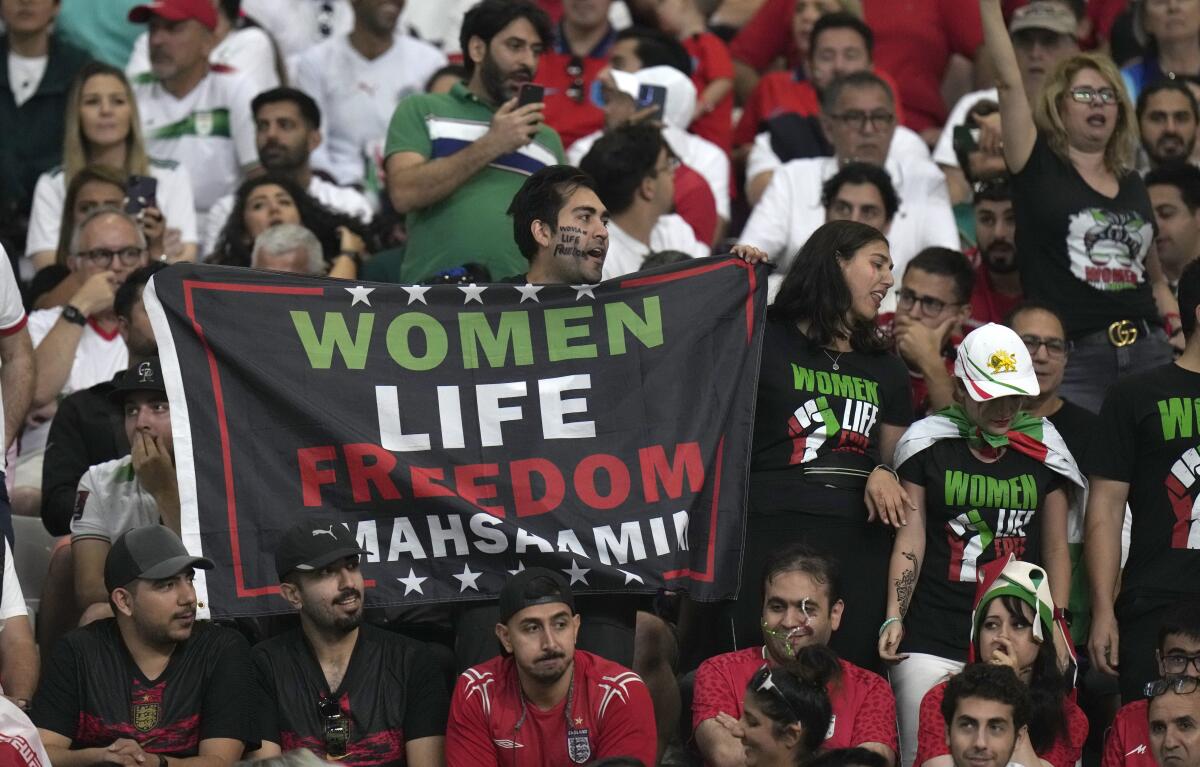
- Share via
AL RAYYAN, Qatar — FIFA president Gianni Infantino has asked for the focus at the World Cup to remain on soccer. But the game took a backseat to politics again Monday when FIFA threatened to sanction players wearing rainbow-colored armbands in support of the LGBTQ community while Iran’s players refused to sing their country’s national anthem before their opening game with England.
The captains of seven European teams said they intended to wear armbands sporting the heart-shaped logo of the OneLove movement, which promotes inclusion and diversity in soccer and society. UEFA allowed teams to use the armbands in the latest round of Nations League games in September, but the decision to wear them in Qatar, where same-sex relationships are banned, was widely viewed as a form of protest.
As a result, just hours before England kicked off against Iran, becoming the first European team to take the field in Qatar, global soccer’s governing body issued a statement saying players not wearing armbands provided by FIFA would be given a yellow card.
Shortly afterward, the soccer federations of the seven European nations — Belgium, Denmark, Germany, the Netherlands, Switzerland, England and Wales, which played the U.S. on Monday — issued statements saying they would abide by the rule. Many promised before the tournament their captains would wear the armbands without FIFA approval.
“FIFA has been very clear that it will impose sporting sanctions if our captains wear the armbands on the field of play,” the teams said in a joint statement on Monday.
After dominating the first half, the U.S. struggles in the second half and gives up a goal to Gareth Bale on a late penalty kick to play to a 1-1 draw with Wales.
Monday’s ruling was just the latest in a dizzying series of politically tinged actions by FIFA. Three days ago, the organization bowed to Qatari demands to ban beer sales at stadiums, and the next morning Infantino delivered an bizarre address in which he said, “I feel gay,” then went on to defend the host nation’s human rights record. On Sunday, the FIFA leader presided over a World Cup opening ceremony whose message centered on inclusion.
The U.S., which has posted rainbow branding at the team’s media center and at fan events, said it always planned to wear the FIFA-provided armband.
“While we never planned to wear a non-FIFA-approved armband, we were supportive of the UEFA teams that planned to wear that OneLove armband,” said Neil Buethe U.S. Soccer’s chief communications officer.
While many European teams — including Wales and LAFC star Gareth Bale — backed off their planned protests, Iran’s players stood silent, arms draped on one another’s shoulders, during their national anthem in an apparent show of solidarity with protesters back home. Iran has been roiled by street demonstrations since the September death of Mahsa Amini, a 22-year-old who was detained by the country’s morality police for not wearing her hijab in accordance with government standards.
There was loud booing during the anthem from the large group of Iranian supporters at Khalifa International Stadium, some of whom held signs reading, “Women, Life and Freedom.” Iran’s Portuguese coach, Carlos Queiroz, has given his players permission to protest while in Qatar. Monday’s game took place as security forces back in Iran fired at demonstrators in two predominantly Kurdish cities.
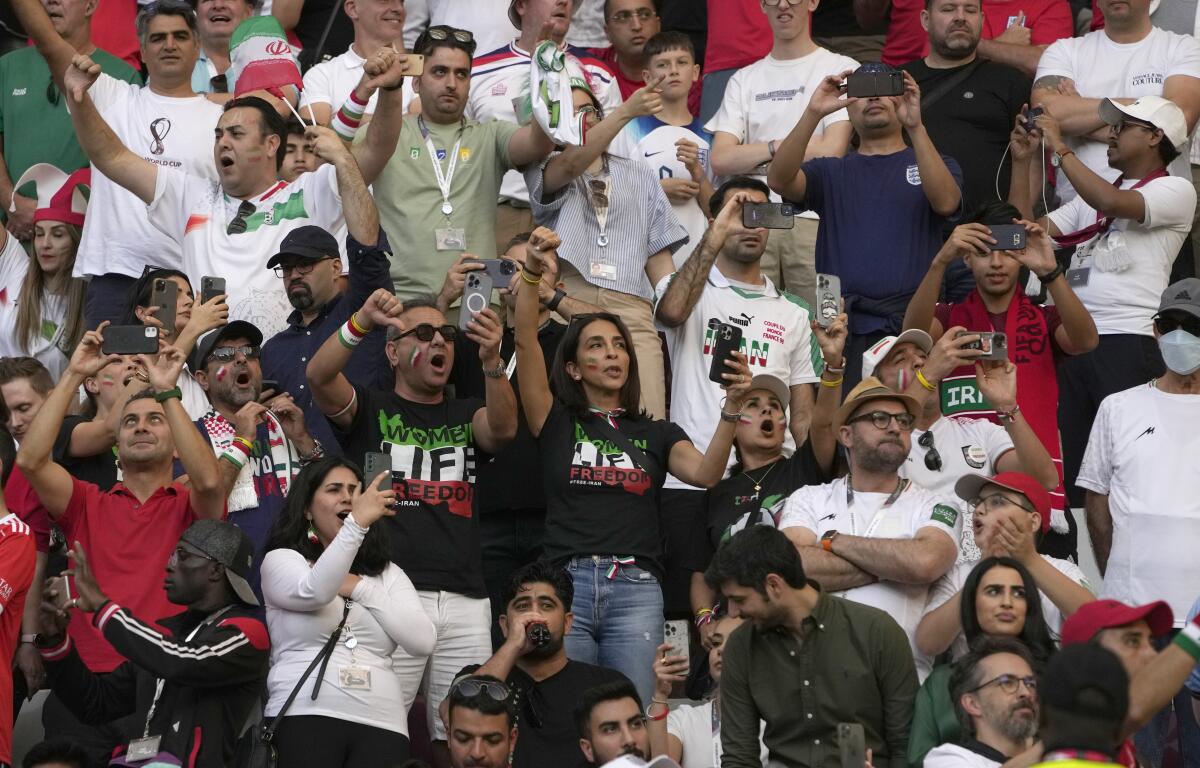
Protesters have adopted the act of cutting their hair as a symbolic gesture of discontent with the Iranian regime. In the International Beach Soccer Cup earlier this month, Iran’s Saeed Piramoun mimicked the act of cutting his hair after scoring in a 2-1 win over Brazil.
The beach soccer team did not sing the national anthem before its semifinal, prompting state television to cut its feed, and the players did not celebrate when awarded the winner’s trophy, instead standing sternly with their arms crossed.
Making history
French referee Stephanie Frappart will become the first woman to work a men’s World Cup game when she serves as the fourth official for Tuesday’s Mexico-Poland game. Three female referees and three assistant referees, including American Kathryn Nesbitt and Mexican Karen Díaz, were invited to Qatar to officiate the tournament, breaking FIFA’s prohibition on using women in men’s World Cup games.
“This is a transformative moment in sports,” said Kari Seitz, FIFA’s head of refereeing for women, who has been pushing for the change for years. “This big step will positively influence those who are still hesitant to give women the opportunities they deserve based on their qualities.”
For the first time, women officials will work the men’s World Cup. Karen Díaz Medina of Mexico and Kathryn Nesbitt of the U.S. are two of the six women chosen.
Frappart was the first woman to referee in the top two tiers of men’s soccer in France, and in 2019 she worked the UEFA Super Cup final between the English clubs Liverpool and Chelsea. A year later she became the first women to referee in the Champions League, doing a match between Juventus of Italy and Ukraine’s Dynamo Kyiv.
Nesbitt will serve as the reserve assistant referee for Tuesday’s France-Australia game.

